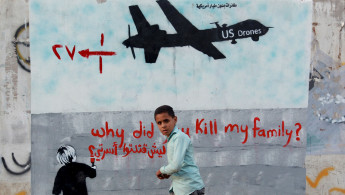Yemeni child killed by US drone 'lived in fear'
A 13-year-old Yemeni boy said that he dreamt of American drones and lived in fear of them, months before he himself was killed by a US drone strike.
Muhammed Tuaiman, killed on January 26 in the Yemeni province of Marib, was given a camera by the Guardian to record his daily life last year, after his father and brother were killed in a drone strike in 2011.
Muhammed's footage captures his siblings playing, riding camels, gathering crops and swimming in a lake. Yet the spectre of the drone strike is never far away. He and his siblings speak of the strike that killed their father, and in one of the shots a drone plane is flying high above them.
“I see them every day and we are scared of them,” Muhammed told the Guardian.
“A lot of the kids in this area wake up from sleeping because of nightmares from them and some now have mental problems. They turned our area into hell and continuous horror, day and night, we even dream of them in our sleep.”
Adel Shamsan, a Yemeni journalist, had taught Muhammed how to use a video camera, and had got to know him well over several trips he made to Marib.
Shamsan had been introduced to Muhammed's story nine months ago by advocates working for the British charity Reprieve.
“It was Muhammed's first time to use a camera,” Shamsan told al-Araby al-Jadeed. “He was from a big, poor family, they didn't have the means to buy a camera... They lived a very simple life.”
Initially finding the camera difficult to operate, Muhammed soon learned how to film, and, according to Shamsan, enjoyed documenting the day-to-day goings on of life in Marib.
“I had to come twice a month to train him on how to use the camera, so he could get good shots,” said Shamsan, who would come down from Yemen's capital Sanaa to tribal Marib.
“He started to get good shots... He started to have different ideas about what he wanted to do in the future, about how he wanted to become an engineer.”
With his father gone, Muhammed and his older brothers shared the burden of taking care of the family - he had 27 siblings.
Anonymous US officials told Reuters that the drone strike that killed Muhammed and two other men in Hareeb, an hour from his home in al-Zur, had killed “three men believed to be al-Qaeda militants”.
In Muhammed's footage, a flag associated with al-Qaeda can be seen in a car he is driving. However, his family deny that Muhammed was an al-Qaeda member.
They did receive money from al-Qaeda to support them, in the absence of any compensation from the Yemeni or American governments.
“Don't blame us because we sympathise with al-Qaeda, because they were the only people who showed their faces to us, the government ignored us, the US ignored us and didn't compensate us,” said Meqdad, Muhammed's older brother.
Shamsan added that the family had no other source of income.
Tribes in Marib are now preparing for an attack from the Houthi movement, who have taken over the central government in Sanaa in an apparent coup, and are advancing on Marib to seize the provinces rich natural resources.
That, coupled with more US drone strikes, has led to tribesmen at least temporarily allying with al-Qaeda depending on the fight – a complex web of actors that will make it hard for drone operators to differentiate al-Qaeda members from tribesmen defending their land.





 Follow the Middle East's top stories in English at The New Arab on Google News
Follow the Middle East's top stories in English at The New Arab on Google News
![The UAE is widely suspected of arming the RSF militia [Getty]](/sites/default/files/styles/image_330x185/public/2024-11/GettyImages-472529908.jpg?h=69f2b9d0&itok=Yauw3YTG)
![Netanyahu furiously denounced the ICC [Getty]](/sites/default/files/styles/image_330x185/public/2024-11/GettyImages-2169352575.jpg?h=199d8c1f&itok=-vRiruf5)
![Both Hamas and the Palestinian Authority welcomed the ICC arrest warrants [Getty]](/sites/default/files/styles/image_330x185/public/2024-11/GettyImages-2178351173.jpg?h=199d8c1f&itok=TV858iVg)